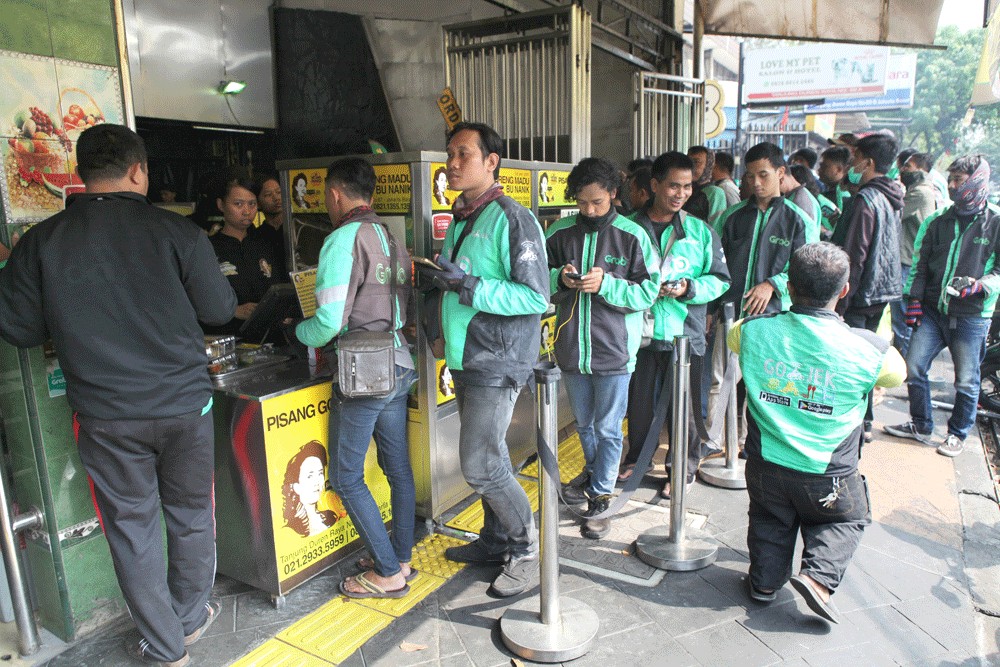Popular Reads
Top Results
Can't find what you're looking for?
View all search resultsPopular Reads
Top Results
Can't find what you're looking for?
View all search resultsFrom foe to friend, ministry commits to fare hike for 'ojol' drivers in Greater Jakarta
While the ojol drivers association and ride-hailing companies have generally welcomed the new pricing policy, a consumer protection group has pointed to a paradox between the fare rise and declining level of services.
Change text size
Gift Premium Articles
to Anyone
T
he Transportation Ministry announced on Tuesday its plans to increase the fare pricing for ride-hailing ojek (motorcycle taxis) in Greater Jakarta, with the new fares to become effective on March 16.
The ministry's move comes in response to the ojol (ojek online) drivers' demands to help them meet the rising cost of living in the capital city and surrounding areas.
The new fare pricing sets a per kilometer floor price of Rp 2,250, up from Rp 2,000 previously, and a per kilometer ceiling price of Rp 2,650, up from Rp 2,500. The policy also fixes the base fare for the first 4 kilometers to between Rp 9,000 and Rp 10,500 depending on the service, from between Rp 8,000 and Rp 10,000 previously.
“This [fare hike] is to accommodate the drivers' aspirations," said land transportation director general Budi Setyadi. Drivers' demand for higher fares was based on the minimum wage hike and increasing living cost in Greater Jakarta, as well as the prevailing ministerial decree that stipulated a quarterly fare evaluation.
"The decision has been made through discussions with other parties, including the YLKI, [ride-hailing] companies and [relevant] associations,” he said, referring to the Indonesian Consumers Foundation (YLKI).
Read also: Ministry mulls over 'ojol' drivers' demand for fare increase in Greater Jakarta
Aside from e-commerce and online travel services, the ride-hailing sector has contributed the most to Indonesia's flourishing digital economy with US$6 billion in 2019, according to the e-Conomy SEA 2019 report by Google, Temasek and Bain & Company. The figure posts growth of 57 percent from $900 million in 2015.
While the ministry's new policy increases the fare pricing for Greater Jakarta, which is designated as Zone 2, it maintains the current pricing for Zones 1 and 3.
The fare pricing for Zone 1 (Sumatra, Bali and Java, excluding Greater Jakarta) is to retain a per km floor price of Rp 1,850 and per km ceiling price of Rp 2,300, while the fare pricing for Zone 3 (Sulawesi, Nusa Tenggara, Maluku and Papua) is respectively Rp 2,100 and Rp 2,600.
The fixed base fare for both zones is between Rp 7,000 and Rp 10,000, depending on the service.
“From our discussions with the ojol drivers association, the call for a fare increase comes from [the drivers] in Greater Jakarta. Meanwhile, based on our discussions with [the drivers] in several regencies and cities in East Java and Central Java, they are fine with the current rate,” said Budi.
The Two-Wheeled Action Movement (Garda), which represents ojol drivers, said that the new fare policy met the drivers’ demand.
“Garda accepts the regulator's decision. It is in line with our calculations, which we have communicated to the Transportation Ministry,” said Garda chief Igun Wicaksono.
Read also: Digital economy reaches new highs in 2019 despite skills gap, cyberattack issues
YLKI chairman Tulus Abadi, however, criticized the ministry for issuing the new pricing policy solely in response to a demand from the drivers, emphasizing that public policy must be based on the needs of the general public in their entirety.
In keeping with the higher fares, Tulus also called on ride-hailing companies Gojek Indonesia and Grab Indonesia to improve their safety standards.as well as the services that their driver partners provided.
“In the early days of ojol, drivers were equipped with face masks and hair covers, but these are no longer [provided] now. Especially amid the current issue of the coronavirus outbreak, it is possible that ojol drivers could become a medium of [infection]” he added, stressing that the drivers must adhere to the principles of consumer protection.
Tulus also highlighted the poor safety record among ojol drivers and their low compliance with road rules.
Separately, Grab and Gojek agreed to implement the new fare pricing, and promised to inform both drivers and users about the new policy.
“It is also our job to monitor the impact this new policy will have on consumers, because it will definitely spark a public reaction,” said Grab Indonesia's head of public affairs, Tri Sukma Anreianno.
Meanwhile, Gojek Indonesia's chief of public policy and government relations, Shinto Nugroho, expected a decrease in customer demand following the fare hike.
However, she expressed hope that the decline would be relatively insignificant, noting that the company's present focus was "long-term sustainability for both drivers and passengers".










